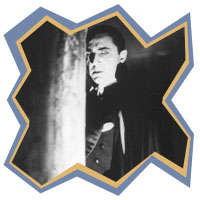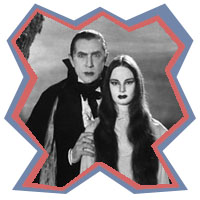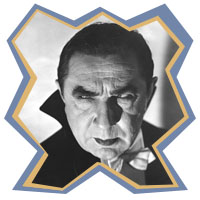
At the peak of his career in the early 1930's, actor Bela Lugosi was the screen's most notorious personification of evil; the most famous and enduring Dracula, he helped usher in an era of new popularity for the horror genre, only to see his own fame quickly evaporate. Béla Ferenc Dezső Blaskó was born in Lugos, Hungary, on October 20, 1882. After seeing a touring repertory company as they passed through town, he became fascinated by acting, and began spending all of his time mounting his own dramatic productions with the aid of other children. Upon the death of his father in 1894, Lugosi apprenticed as a miner, later working on the railroad. His first professional theatrical job was as a chorus boy in an operetta, followed by a stint at the Budapest Academy of Theatrical Arts. By 1901, he was a leading actor with Hungary's Royal National Theatre, and around 1917 began appearing in films (sometimes under the name Arisztid Olt) beginning with
A Régiséggyüjtö.

Lugosi was also intensely active in politics, and he organized an actors' union following the 1918 collapse of the Hungarian monarchy; however, when the leftist forces were defeated a year later he fled to Germany, where he resumed his prolific film career with
Der Wildtöter Und Chingachgook (1920). Lugosi remained in Germany through 1921, when he emigrated to the United States. He made his American film debut in
The Silent Command (1923), but struggled to find further work, cast primarily in exotic bit roles on stage and screen. His grasp of English was virtually non-existent, and he learned his lines phonetically, resulting in an accented, resonant baritone which made his readings among the most distinctive and imitated in performing history. In 1924, Lugosi signed on to direct a drama titled
The Right To Dream, but unable to communicate with his cast and crew he was quickly fired; he sued the producers, but was found by the court to be unable to helm a theatrical production and was ordered to pay fines totalling close to $70. When he refused, the contents of his apartment were auctioned off to pay his court costs -- an inauspicious beginning to his life in America, indeed.
Lugosi's future remained grim, but in 1927 he was miraculously cast to play the title character in the Broadway adaptation of the Bram Stoker vampire tale
Dracula; reviews were poor, but the production was a hit, and he spent three years in the role. In 1929, Lugosi married a wealthy San Francisco widow named Beatrice Weeks, a union which lasted all of three days; their divorce, which named Clara Bow as the other woman, was a media sensation, and it launched him to national notoriety. After a series of subsequent films, however, Lugosi again faded from view until 1931, when he was tapped to reprise his Dracula portrayal on the big screen. He was Universal executives' last choice for the role -- they wanted Lon Chaney Sr., but he was suffering from cancer -- while director Tod Browning insisted upon casting an unknown. When no other suitable choice arose, however, only Lugosi met with mutual, if grudging, agreement. Much to the shock of all involved,
Dracula was a massive hit. Despite considerable studio re-editing, it was moody and atmospheric, and remains among the most influential films in American cinema.
 Dracula
Dracula also rocketed Lugosi to international fame, and he was immediately offered the role of the monster in James Whale's
Frankenstein; he refused -- in order to attach himself to a picture titled
Quasimodo -- and the part instead went to Boris Karloff. The project never went beyond the planning stages, however, and in a sense Lugosi's career never righted itself; he remained a prolific screen presence, but the enduring fame which appeared within his reach was lost forever. Moreover, he was eternally typecast: Throughout the remainder of the decade and well into the 1940's, he appeared in a prolific string of horror films, some good:
Island Of Lost Souls (1932) and
The Black Cat (1934, the first of many collaborations with Karloff), but most of them quite forgettable. Lugosi's choice of projects was indiscriminate at best, and his reputation went into rapid decline; most of his performances were variations on his Dracula role, and before long he slipped into outright parodies of the character in pictures like
Abbott & Costello Meet Frankenstein (1948), which was to be his last film for four years.
As Lugosi's career withered, he became increasingly eccentric, often appearing in public clad in his Dracula costume. He was also the victim of numerous financial problems, and became addicted to drugs. In 1952, he returned from exile to star in
Bela Lugosi Meets A Brooklyn Gorilla, followed later that year by the similarly low-brow
My Son, The Vampire and
Old Mother Riley Meets The Vampire. By 1953, Lugosi was firmly aligned with the notorious filmmaker Ed Wood, widely recognized as the worst director in movie history; together they made a pair of films --
Glen or Glenda? and
Bride Of The Monster -- before Lugosi committed himself in 1955 in order to overcome his drug battles. Upon his release, he and Wood began work on the infamous
Plan 9 From Outer Space, but after filming only a handful of scenes, Lugosi died of a heart attack on August 15, 1956; he was buried in his Dracula cape. In the decades to come, his stature as a cult figure grew, and in 1994 the noted filmmaker Tim Burton directed the screen biography Ed Wood, casting veteran actor Martin Landau as Lugosi; Landau was brilliant in the role, and won the Oscar which Lugosi himself never came remotely close to earning -- a final irony in a career littered with bittersweet moments.
Jason Ankeny, All Movie Guide











